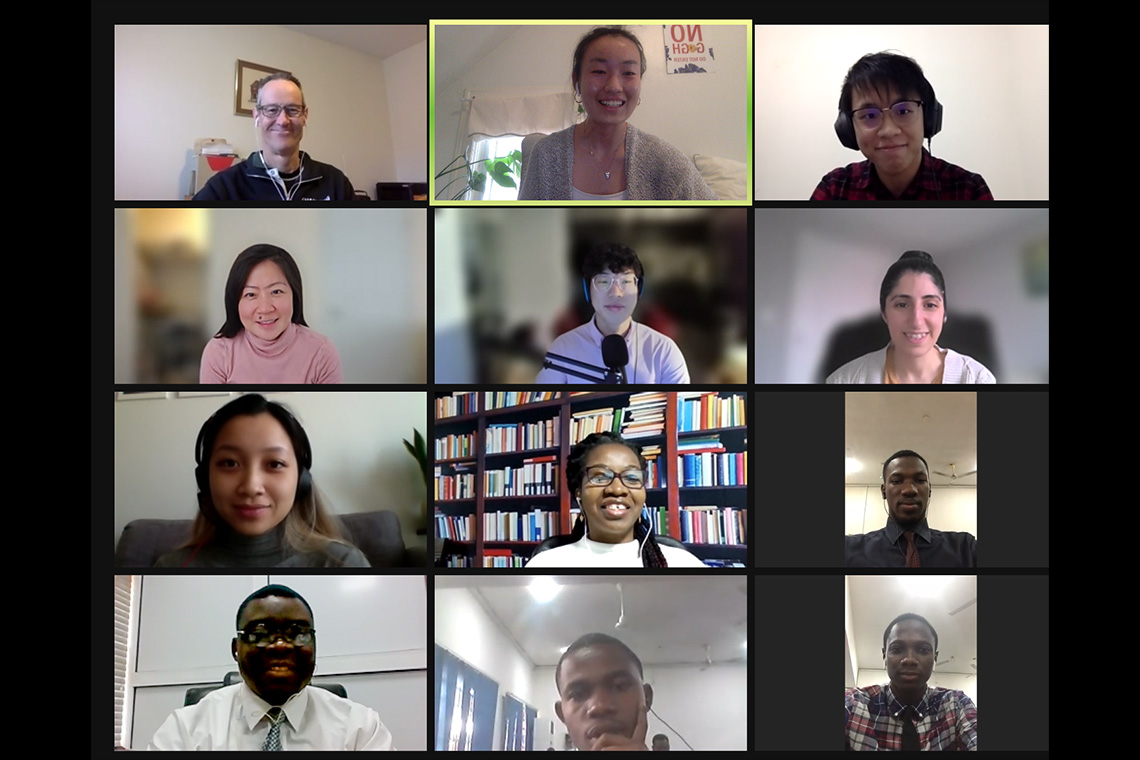Every Friday, four students from the University of Toronto hop on a Zoom call with students in Nigeria to share updates on their joint mission: building a low-cost biogas generator for remote communities in Africa’s most populous country.
The meetings are a part of the Global Classrooms project, which brings together students in U of T’s Faculty of Applied Science & Engineering and Nigeria’s Covenant University. The international student team is using cassava peels and other agricultural waste to produce gas for cooking and heating — a more environmentally friendly and less toxic alternative to the burning of wood for fuel.
Jennifer (Chen Yu) Wang (Year 4 ChemE), one of the four U of T students working on the biogas generator, says the experience has been an eye-opener.
“It’s very different designing for the developed world compared to designing for a developing world context,” says Wang. “You have to approach it differently because you have a lot of constraints to work with. You might go in with a design or prototype, but there are a lot of aspects that need to be taken care of beyond the technical design.
“That’s one thing that a lot of engineers aren’t exposed to — or at least, I wasn’t. It really challenged my thinking.”
The project recently earned the Award of Excellence in Multidisciplinary Engineering Design from the University of Toronto Institute for Multidisciplinary Design & Innovation. It was carried out as part of APS 490, a multidisciplinary capstone course that’s supervised by Professor Ariel Chan (ChemE) and Professor Emeritus Graeme Norval (ChemE). This course immerses the students in a real-world engineering challenge within a Global Classrooms setting, where cross-cultural collaboration and international learning are front and centre.
“The Global Classroom enables our students to be placed in a learning environment that’s not limited to U of T — it’s in the world,” says Chan. “It helps them understand a real-life problem in a different part of the world and explore how they can use their engineering concepts to tackle it.”
Chan’s course is one of 52 U of T Global Classrooms funded by U of T’s International Office, spanning 96 partners across 34 countries and running between Summer 2021 and Summer 2022. The Global Classrooms initiative supports professors and instructors who want to provide a globally relevant educational experience to their students. The program is currently accepting applications for the 2022-2023 cycle until May 13, with decisions on funded proposals to be made in early June.
“Creating a Global Classroom requires dedication, passion and a little bit of innovation for you to understand how you can take what you’ve been teaching in the same way, for perhaps a few months or a few years, and internationalize the opportunity,” says Professor Elham Marzi (ISTEP), who also served as one of three faculty advisers for the Global Classrooms initiative in its first year.
Marzi says Global Classrooms provide students with a priceless opportunity to expand their perspectives, hone cross-cultural skills and develop compassion and empathy for people in other countries around the world and the challenges they face.
“We’re hoping for every student here to be able to come away not only with global competency skills, but also with a better understanding for their fellow human,” she says.

Indeed, as Wang and her fellow U of T students go about creating simulations and designs for a generator, they’re required to adapt to resources and conditions in rural communities in Nigeria — information that is studied and supplied by the students at Covenant University under the supervision of Professor David Olukanni.
U of T team member Truman Yuen (Year 4 ChemE) says Global Classrooms creates real-world challenges that are difficult to replicate “even in internships,” given the variability of standards and protocols in countries around the world.
“When we’re creating a design that is unprecedented and new in a developing country, there are so many other things to consider that we don’t think about,” Yuen says. “So, this is a nice experience which, when we tackle future designs, will help us appreciate how the standards and roles that are put in place for us here help with our design process.”
The project also helped students hone a variety of soft skills, according to Jenny Pham (Year 4 ChemE), whose duties included serving as the point of communication between the two teams of students and their professors.
“We had to coordinate different timelines and deadlines, making sure that we’re able to communicate our points or discuss deliverables with the other team,” says Pham. “Working with people on the other side of the globe in such a big team really improved those soft skills for us.”
Wilson (Wei Cheng) Yeoh (Year 4 MechE) noted the importance of developing a rapport with the students in Nigeria.
“At the beginning of the project, we had to spend time not just talking about the technical aspects but also about ourselves and our expectations,” he says. “The cultures and norms that apply to our university context might not be the same for the other university. That’s one thing I learned the most.”
For Yeoh, an international student from Malaysia, the project was also an opportunity to develop skills that might be helpful back home where, he notes, vast amounts of agricultural waste are generated each year.
“If I have the chance, I’d love to take what I’ve learned collaborating with Nigeria and apply it in Malaysia,” he says.
The students weren’t the only ones to find the Global Classroom a fulfilling learning experience.
“It pushed me to consider a lot of possibilities in engineering design and allowed me to see how design can be flexible and how a variety of combinations can be used to achieve the same result,” says Chan, their professor.
“But also, [it taught me] compassion and helped me see how I can be of use beyond just teaching — by contributing as a global citizen.”




